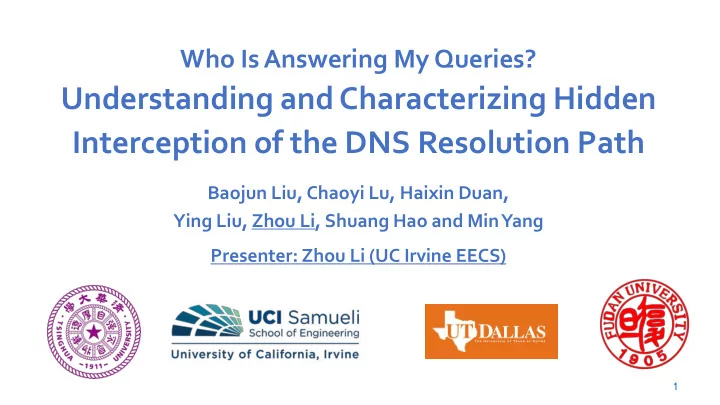

Who Is Answering My Queries? Understanding and Characterizing Hidden Interception of the DNS Resolution Path Baojun Liu, Chaoyi Lu, Haixin Duan, Ying Liu, Zhou Li, Shuang Hao and MinYang Presenter: Zhou Li (UC Irvine EECS) 1
DNS Resolution • DNS: the beginning of Internet activities Authoritative servers – By a recursive resolver – Usually assigned by ISP Root NS request response 1. irtf.org? 4 TLD NS 5 8. 64.191.0.198 Client Recursive Resolver SLD NS 2
DNS Resolution • Why public DNS? – Performance (e.g., load balancing) – Security (e.g., DNSSEC support) – DNS extensions (e.g., EDNS Client Subnet) 3
DNS Interception • Who is answering my queries? Irft.org? Google DNS 8.8.8.8 Client I’m 8.8.8.8, irtf.org is at Authoritative 64.191.0.198. nameserver Alternative resolver 1.2.3.4 Spoof the IP address and intercept queries. 4
Potential Interceptors Network Providers (ISP) Censorship / firewall Anti-virus software / malware (E.g., Avast anti-virus) Enterprise proxy (E.g., Cisco Umbrella intelligent proxy) 5
Potential Interceptors Network Providers * https://labs.ripe.net/Members/babak_farrokhi/is-your-isp-hijacking-your-dns-traffic 6 * https://www.cactusvpn.com/tutorials/find-out-isp-doing-transparent-dns-proxy/
Q1: How prevalent is DNS interception? Q2: What are the characteristics of DNS interception?
Motivation Threat Model Methodology Analysis
Threat Model • Taxonomy (request) – [1] Normal resolution Public DNS Request to 8.8.8.8 8.8.8.8 On-path Client Authoritative Device server Alternative resolver 1.2.3.4 9
Threat Model • Taxonomy (request) – [2] Request redirection Public DNS Request to 8.8.8.8 8.8.8.8 On-path Client Authoritative Device server Alternative resolver 1.2.3.4 10
Threat Model • Taxonomy (request) – [3] Request replication Public DNS Request to 8.8.8.8 8.8.8.8 On-path Client Authoritative Device server Alternative resolver 1.2.3.4 11
Threat Model • Taxonomy (request) – [4] Direct responding Public DNS Request to 8.8.8.8 8.8.8.8 On-path Client Authoritative Device server Alternative resolver 1.2.3.4 12
Motivation Threat Model Methodology Analysis
How to Detect? • End-to-end data collection and comparison Check where Send DNS requests. they are from. Public DNS Request to 8.8.8.8 8.8.8.8 On-path Client Authoritative Device server Alternative resolver 1.2.3.4 14
Vantage Points • Phase I: Global Analysis – ProxyRack: SOCKS residential proxy networks – Limitation: TCP traffic only • Phase II: China-wide Analysis – A network debugger module of security software – Similar to Netalyzr [Kreibich, IMC’ 10] – Capability: TCP and UDP; Socket level 15
DNS Requests • Requirements – Diverse : triggering interception behaviors – Controlled : allowing fine-grained analysis Public DNS Google, OpenDNS, Dynamic DNS, EDU DNS Protocol TCP, UDP QTYPE A, AAAA, CNAME, MX, NS QNAME (TLD) com, net, org, club QNAME UUID.[Google].OurDomain. [TLD] 16
Collected Dataset • DNS requests from vantage points – A wide range of requests collected Phase # Request # IP # Country # AS ProxyRack 1.6 M 36K 173 2,691 Debugging tool 4.6 M 112K 87 356 17
Motivation Threat Model Methodology Analysis
How many queries are intercepted?
Magnitude • Investigated Ases 198 ASes 61 ASes have intercepted traffic have intercepted traffic (of 2,691, 7.36%, TCP) (of 356, 17.13%) 20
Magnitude • Interception ratio – China-wide analysis, UDP & TCP 27.9% 12.6% 7.3% 0.9% 16.1% 9.8% EDU DNS 2.3% 1.1% Popular resolvers are prone to be intercepted. 21
How are my queries intercepted?
Interception Characteristics • Magnitude (% of total requests) – Normal resolution Request redirection Request replication 6.3% Direct responding is 7.8% 9.7% 22.3% rare. Request redirection > 90.2% 87.4% 83.9% 72.1% Request replication OpenDNS Dyn DNS EDU DNS Google 23
Are my responses tampered?
Response Manipulation • DNS record values – Most responses are not tampered . – Some exceptions: Classification # Response Example Client AS Gateway 54 192.168.32.1 AS4134, CN, China Telecom Monetization 10 39.130.151.30 AS9808, CN, GD Mobile Misconfiguration 26 ::218.207.212.91 AS9808, CN, GD Mobile Others 54 fe80::1 AS4837, CN, China Unicom 25
Response Manipulation • Example: traffic monetization China Mobile Group of Yunnan: advertisements of an APP . 26
So why should I care? Any threats?
Security Threats • Ethics & privacy – Users may not be aware of the interception behavior • Alternative resolvers’ security – An analysis on 205 open alternative resolvers ALL BIND Only 43% versions resolvers should be support deprecated DNSSEC before 2009 28
How can I prevent this?
Solutions • DNSSEC and validation at client-side * Pic from: https://www.keycdn.com/support/dnssec/ 30
Solutions • Encrypted DNS DNS * Pic from: https://tenta.com/blog/post/2017/12/dns-over-tls-vs-dnscrypt 31
Solutions • Encrypted DNS – Resolver authentication (RFC8310) – DNS-over-TLS (RFC7858) – DNS-over-DTLS (RFC8094, experimental) – DNS-over-HTTPS (RFC8484) • Online checking tool – Which resolver are you really using? – http://whatismydnsresolver.com/ 32
Conclusions • Understanding – A measurement platform to systematically study DNS interception • Findings – DNS interception exists in 259 ASes we inspected globally – Up to 28% requests from China to Google are intercepted – Security concerns • Mitigation – Resolver authentication; online checking tool 33
Thank you! • Details in our Usenix Security’18 paper – Who Is Answering My Queries? Understanding and Characterizing Hidden Interception of the DNS Resolution Path • UC Irvine author contact – Zhou Li (Assistant Professor) – zhou.li@uci.edu – https://faculty.sites.uci.edu/zhouli/ – Looking for collaborations ☺ 34
Recommend
More recommend